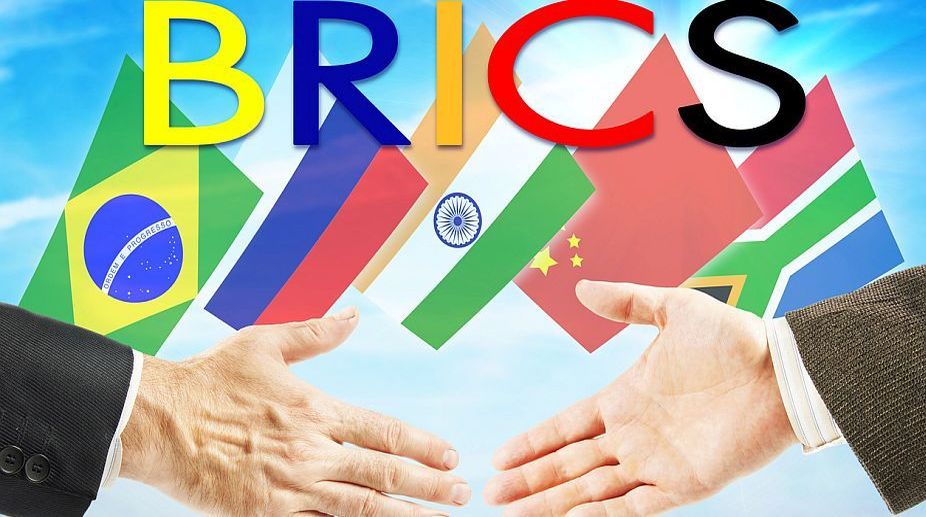Art show showcasing city’s heritage
The exhibition will feature eminent artists from Kolkata reflecting the city’s rich cultural heritage.

(Photo: Getty Images)
Brazil, Russia, India, China and South Africa (BRICS countries) together occupy a significant space in the changing world economic order. These five emerging world economies have diverse political legal order but when combined they make a lasting impact.
BRICS countries when understood in tandem comprise approximately 43 per cent of the world population, having 37 per cent of the world Gross Domestic Product (GDP) and 17 per cent share in world trade. All BRICS countries have gradually become part of major international and multilateral institutions across the globe. These include – entry of BRICS States into World Trade Organisation (WTO), the United Nations (U.N.), the Group of 20 (G-20) and the UN Framework Convention on Climate Change (UNCCC), and have also become very active participants of these institutions. With the steady economic progress made by BRICS states since their coming together, the trends in inflows and outflows of foreign direct investment, trade openness, current account balance, forex reserves and economically active labour forces amongst these States, make them a formidable force to reckon with in future.
The BRICS states are also increasingly becoming FDI friendly both in terms of outward foreign direct investment (FDI) and inward FDI. However, there are certain inherent challenges which BRICS states need to overcome urgently in order to emerge as investors’ paradises and soughtafter neutral destinationa of Investor State Dispute Settlement (ISDS). In an era of growing investment regime, the ISDS mechanism is the primary concern of every investor and probably one of the significant decisive factors to consider investing in a host country.
Advertisement
Guided by this trade and commerce factor, all five BRICS nations acted wisely and ratified the Convention on the Recognition and Enforcement of Foreign Arbitral Awards, 1958 also known as New York Convention. The New York Convention is the basic international instrument which provides an ease of recognition and enforcement of foreign seated arbitral awards amongst the State parties who have ratified this Convention. However, the majority of BRICS nations have shown complete disregard towards the International Centre for Settlement of Investment Disputes (ICSID) formed under the aegis of the World Bank for the settlement of investment disputes between themselves and other States.
The ICSID institution originated from the Convention on the Settlement of Investment Disputes, 1966. The Peoples’ Republic of China is the only BRICS nation that has ratified ICSID convention. It is quite surprising that BRICS states which are considered to be emerging economies and said to be destined to change the world economic order in future are not finding themselves on the right side of the World Bank monitored international mechanism of dispute resolution. This is especially bizarre when ICSID has been ratified by 156 out of 192 nations of the world. The hostility of Brazil, Russia, India and South Africa towards ICSID is a critical concern.
The dominance of developed western States in the World Bank-operated ICSID mechanism and the fear of ICSID not being sensitive towards economic needs of BRICS States could be understood as two major reasons of such hostility. Perhaps, trust deficit between the developed States and the developing economies also lies underneath BRICS avoidance of ICSID. This geo-political syndrome is certainly an anathema to an investment growth in BRICS countries. To revolutionise investment within their group, BRICS States need to establish their own investment dispute resolution centre or probably centres in each of the five countries.
The need is imminent because non-ratification of ICSID and lacwking in neutral dispute resolution mechanism will be detrimental to inward-FDI in BRICS States. A small beginning of establishing a BRICS dispute resolution regime was made in 2015 with the inauguration of ‘BRICS Dispute Resolution Shanghai Centre’. A similar echo was heard twice in New Delhi from August 2016 till date, especially when India had the BRICS Presidency from February 2016 till December 2016.
Firstly, in a conference on ‘International Arbitration in BRICS: Challenges, Opportunities and Road Ahead’ which concluded in August 2016, Union Finance Minister Arun Jaitley made a strong case for BRICS nations developing their own arbitration mechanism to cut reliance on redressal centres in developed nations whose awards at times tend to be loaded against developing countries. Secondly, at the 3rd BRICS Legal Forum Meet which concluded in New Delhi on 12 September 2016 it was resolved to establish the ‘International Dispute Resolution Centre for BRICS and Emerging Economies at New Delhi’. Both the Shanghai and the New Delhi Centres under the aegis of BRICS States can emerge as key players in the ISDS regime.
However, the real test lies in upholding the values of non-political character, neutral nature, transparency, cost-effectiveness and to be least procedural in conduct of proceedings. Balancing investors’ rights with the local economic constraints and needs of BRICS States will be an additional challenge for the BRICS Dispute Resolution Centres.
Overall, conducive dispute resolution mechanism lubricated by apolitical nature, timeliness and impartial character; and support of a non-interfering judiciary with a promise of ensuring prompt recognition and enforcement of foreign seated arbitral awards, are sine qua non for BRICS emergence as investors’ paradise combating geo-political challenges within a group as well as from the other developed economies.
(The writer is Assistant Director (Research) and Assistant Professor of Law, National Law University of Odisha)
Advertisement